‘Ma mémoire s’évapore’ (2020)
Translated from Japanese, this book entered my personal book collection when I arrived to Paris. I keep a blurry memory of its strange stories yet remembered the pleasant feeling I had had when I discovered this book and its author 10 years ago. During lockdown, I had the chance to read this book again. The short story ‘Sleep’ about a woman who stops sleeping after having a strange dream, resonated in me. Not being able to sleep, the woman in the story decides to read non-stop, novels she had once loved but had forgotten.
By weaving the pages of this book, I wish to evoke the way books we read and forget become tangled memories.
“Until that reading, I hadn’t realized how little I remembered of what goes on in the book. I recognized virtually nothing―the characters, the scenes, nothing. I might as well have been reading a whole new book. How strange. I must have been deeply moved at the time I first read it, but now there was nothing left. Without my noticing, the memories of all the shuddering, soaring emotions had slipped away and vanished.” (…)
“All the memories I have from the time before I stopped sleeping seem to be moving away with accelerating speed. It feels so strange, as if the me who used to go to sleep every night is not the real me, and the memories from back then are not really mine”
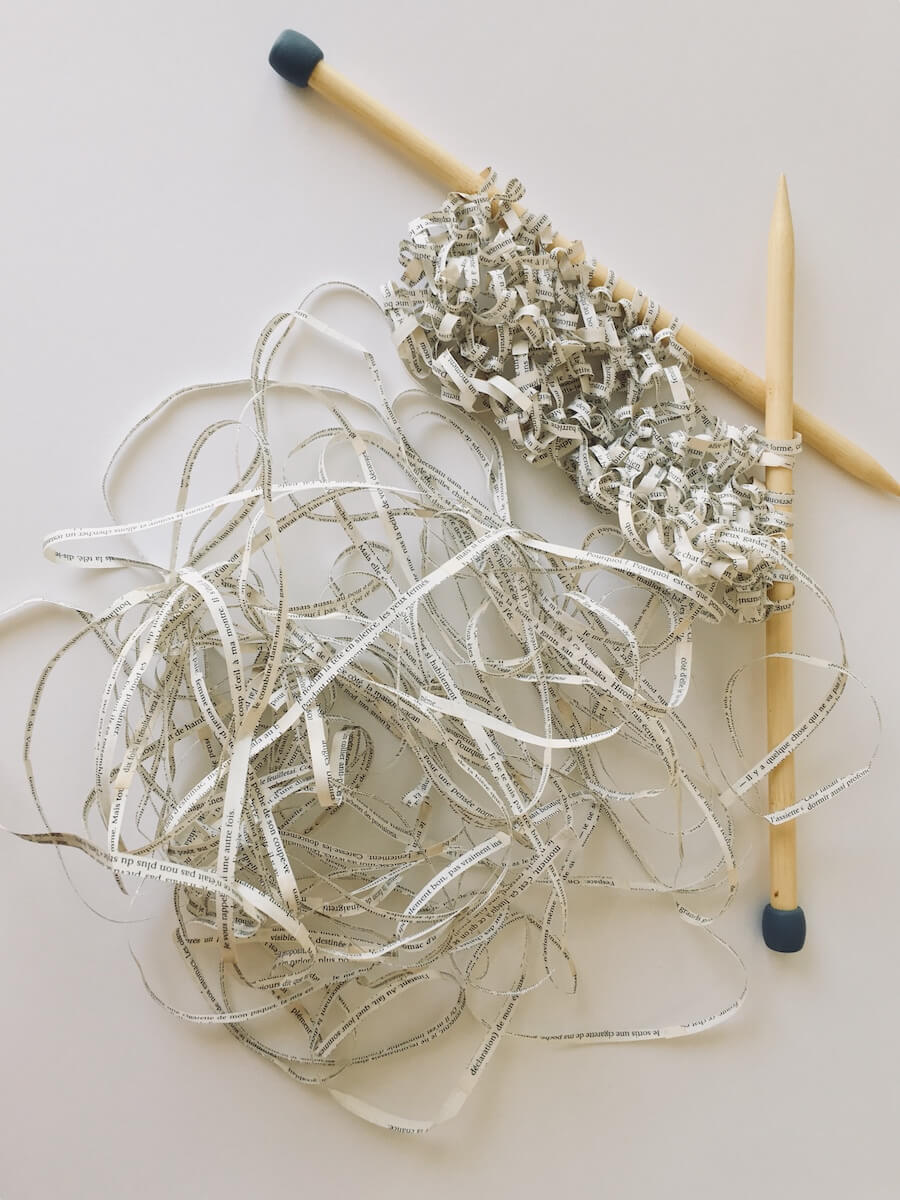
Speak Mnemosyne,
An Ocean of Words and some Middle-Grounds
“Parce que leur mémoire est courte, les hommes accumulent d’innombrables pense-bêtes”
“Because their memory is short, men accumulate countless reminders”
‘Toute la Mémoire du monde’ – Alain Resnais 1956
This project consists of a series of sculptures and drawings, ‘pense-bêtes’ – ‘reminders’, poetic images made out of book pages, prints, ceramic, textile, paper and wax, in which words are essential; Woven words, engraved words, words as drawing, words as knitwork, words on book pages; words as the cartography and the architecture of our identity.During the first months of lockdown, I began to explore this subject which had interested me before, but that I wished to address from a more personal point of view; my relationship to language and identity and the role that remembering and forgetting have had in the process of modeling and reconstructing my identity in exile. Through this series of artworks, I am interested in reflecting on my emotional relationship with language(s), which I imagine as intimate and deep as an ocean. In the infinite cartography of our identity, words become maps and constellations of meaning, which constitute an important part of who we are. There are places made of words, or memories, which, forgotten or unknown, are invisible to us, others which constitute intermediate territories, territories of understanding, where we are able to “translate ourselves”. I also wished to consider the relationship of language with biological processes scientifically related to learning, recalling and obliterating, such as sleeping and dreaming.
Language is one of the least noticeable, yet strongest links between our “internal life” and who we are, and the way we function in the “outside world”. Whenever we move to a new territory, physically or emotionally, we carry with us the baggage of experience that is stored in the form of sensory and verbal memories. Images, feelings, voices, and words are all memories that constitute part of our identity and in this way the language or languages with which we grow up are essential underpinning elements in our individuality continuously ‘under-construction’. Language takes a dynamic part in shaping our individual vision of the world and is the medium of our interactions with people around us. They serve as ‘filters’ between the others and us. Yet, we truly realize the importance of language when the link between the world and our internal linguistic representation of it is severed or called into question. This can happen when we leave our homeland and enter a new life in a new language. Regardless of what pushes us to leave our “familiar territory” to go in exile, a notion that nowadays is much more broadly understood, there is one thing all displaced, “shifted” individuals take along with us, and that is our language(s). Language comes with a representation of our surrounding reality, our native culture and our verbal traditions and beliefs such as old proverbs and idiomatic expressions.
I have many times felt “lost in translation”. Spanish, is my mother tongue. English, is the language in which I did all my scholar years from kindergarten to high school, and it represents a father tongue and an academic language to me. I learned French during my early pre-adolescence, and it is the language I have lived in for the past 10 years. French nourishes me intellectually and has become in a way my language of thought. Arabic, the long-lost language, symbolizes my quest for my Lebanese origins, which constitutes an important part of my identity and part of my work. It represents all the memory lost when this language was not transmitted by my grandparents to their children. A gap in my family history and identity that I try to mend as I slowly learn this once secret tongue.Though some aspects of our identity might be forever lost in translation, a lot about ourselves might be found or rediscovered, hence the loss might turn into reconstruction. In the on-going process of creating a new linguistic mapping from thoughts and emotions to words, these languages have become a way for me to constantly invent and explore my own voice. I am always on the way to my “linguistic home”.
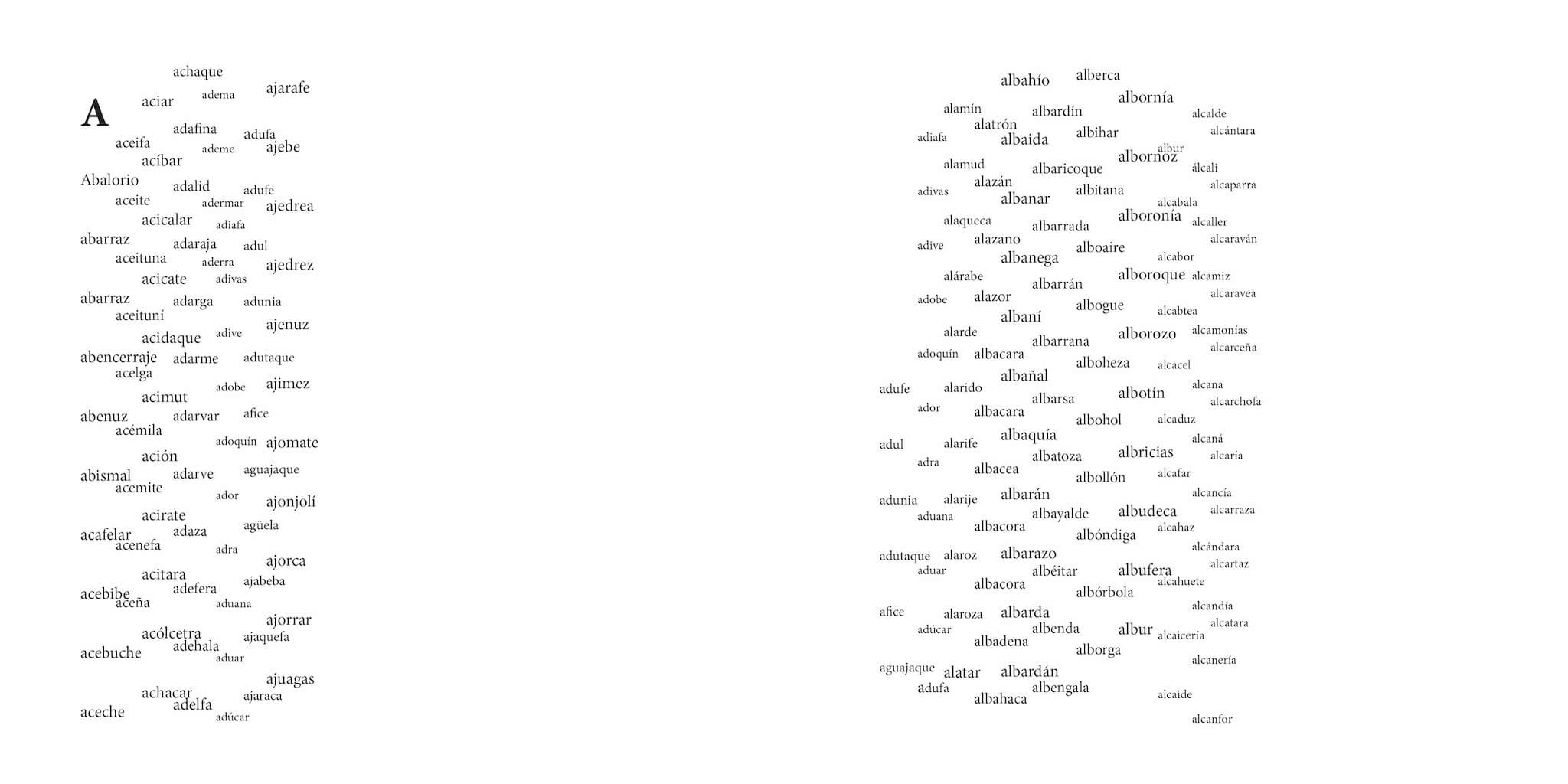
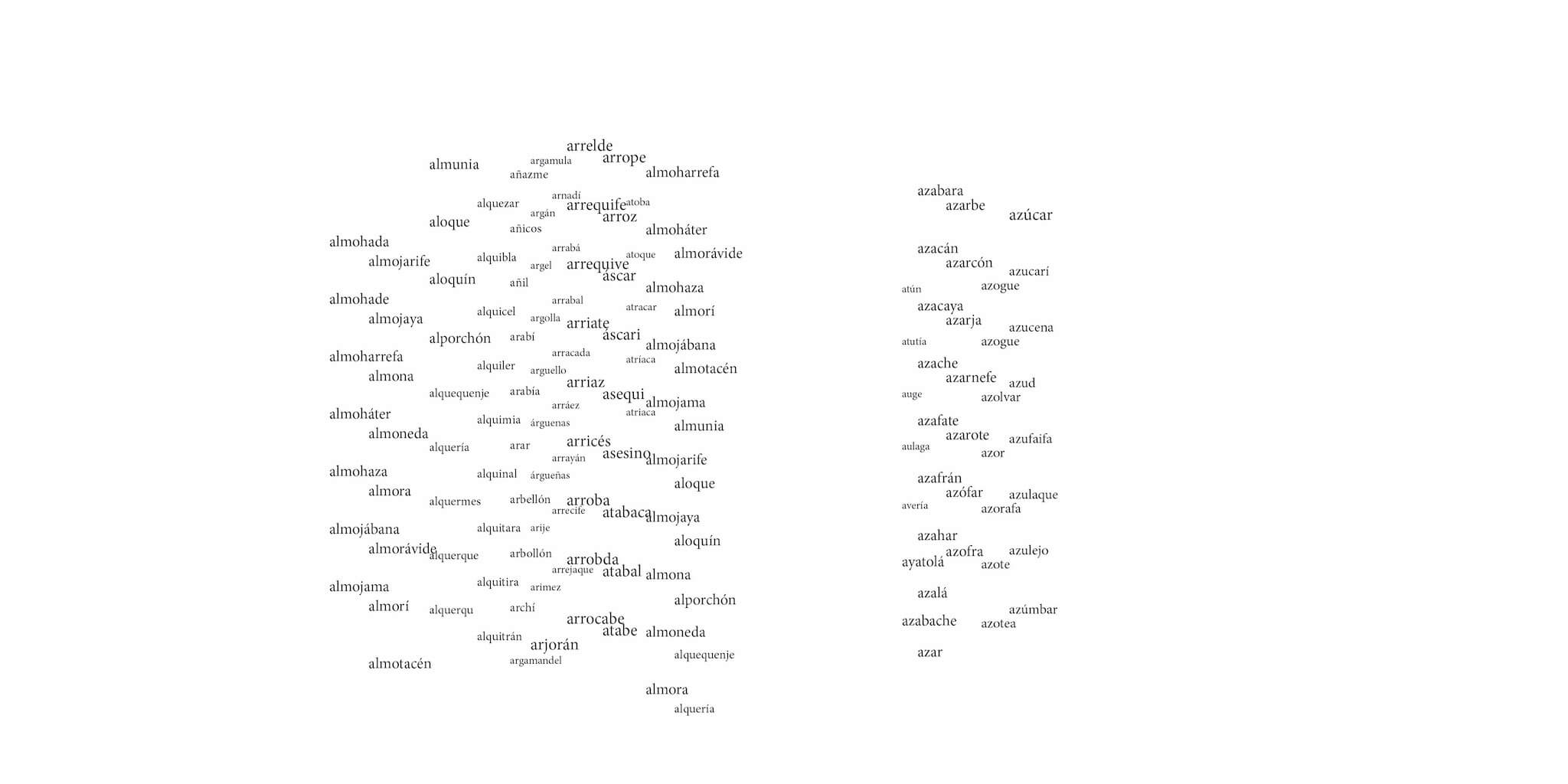
Collection of Spanish words of Arabic origin arranged as a mushrabiyah* of words.
The Mozarab heritage hidden in the Colombian architecture, revels clear traces of a rich historical Colonial past. Stubborn ruins of a bygone oriental décor, such as Mashrabiyas in the intimacy of house patios, quietly guided me through the initial process of excavating my Lebanese roots. In a similar way, the linguistic Arabic heritage in Spanish, which is truly compelling, has been constructive when learning Lebanese-Arabic. I soon realized I was finding my lost language rooted in the semantic architecture of my own Mother Tongue.
Basil, Albahaca, in Spanish, finds its etymologic origin in the Arabic word al-habaqa. It was the name that Arabs gave to aromatic plants used in cooking and medicine. It has been said that habaqa means ‘to penetrate the brain with its sweet smell’.
Triggering vivid sensory memory, basil’s fragrant perfume reminds of my grandparent’s patio in Colombia and the aromatic gardens in the balconies in Beirut.
*Mashrabiyas, are latticework sculpted window is traditional in Islamic Architecture. Along with other distinct features of historic Islamic architecture, they were being demolished as part of a modernisation program across the Arab world from the first decades of the 20th-century. One of the major purposes of the mashrabiya is privacy, an essential aspect of Arab and Muslim culture from the mashrabiya window, occupants can obtain a good view of the street without being seen.
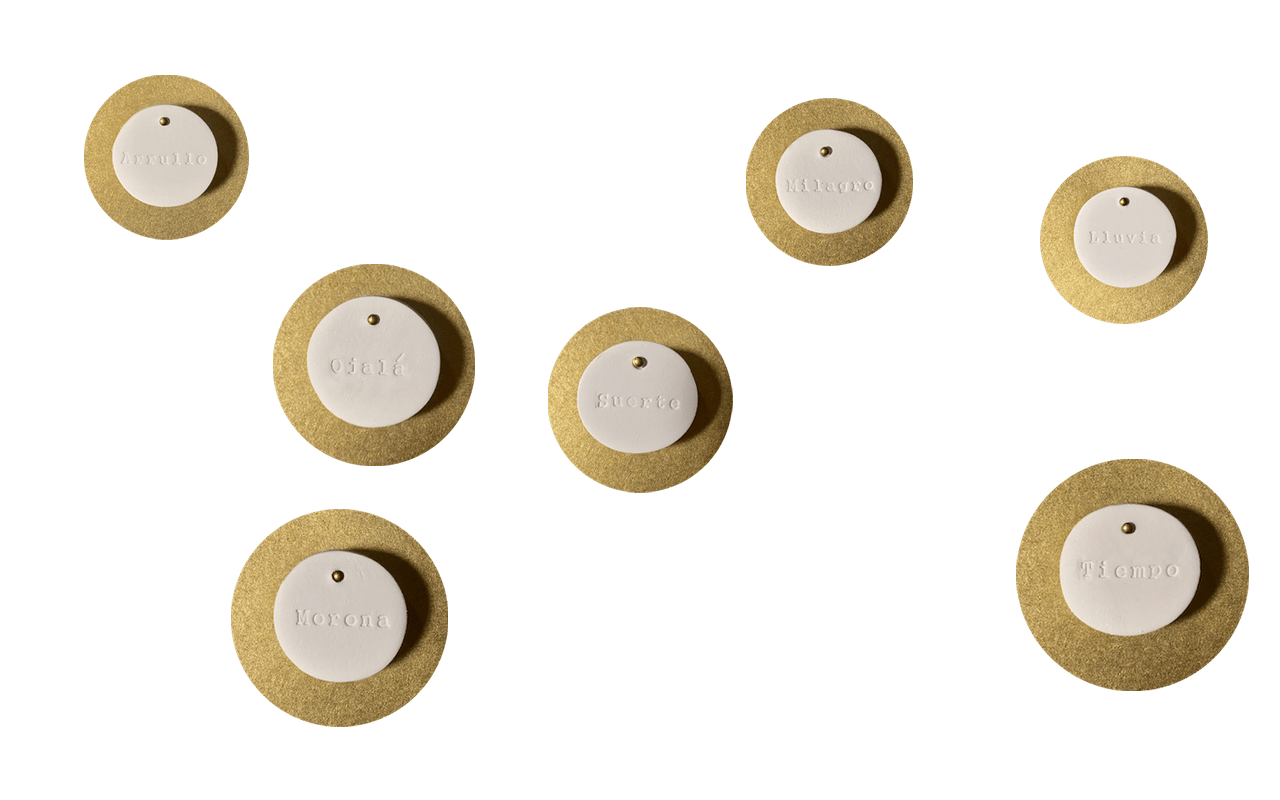
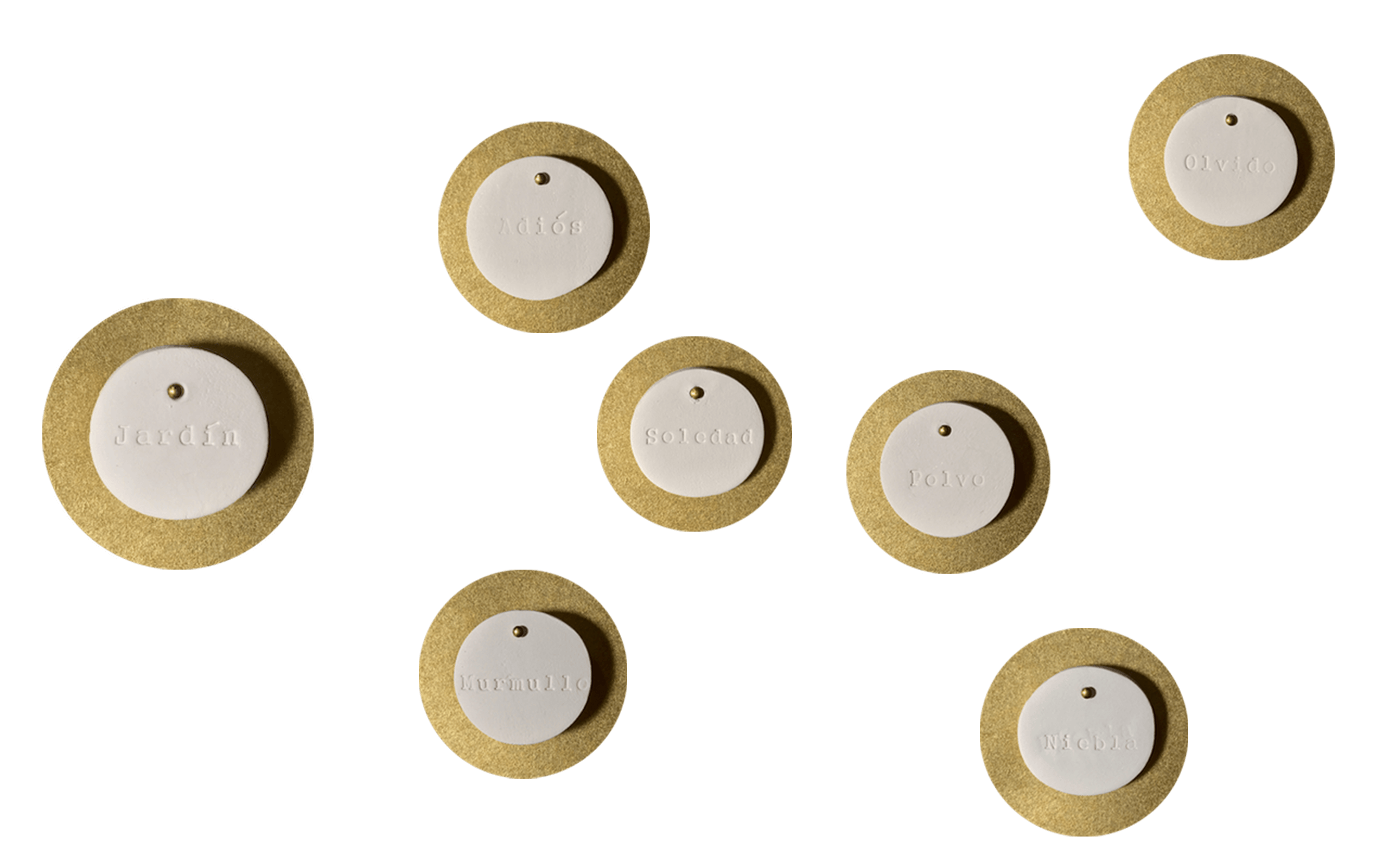
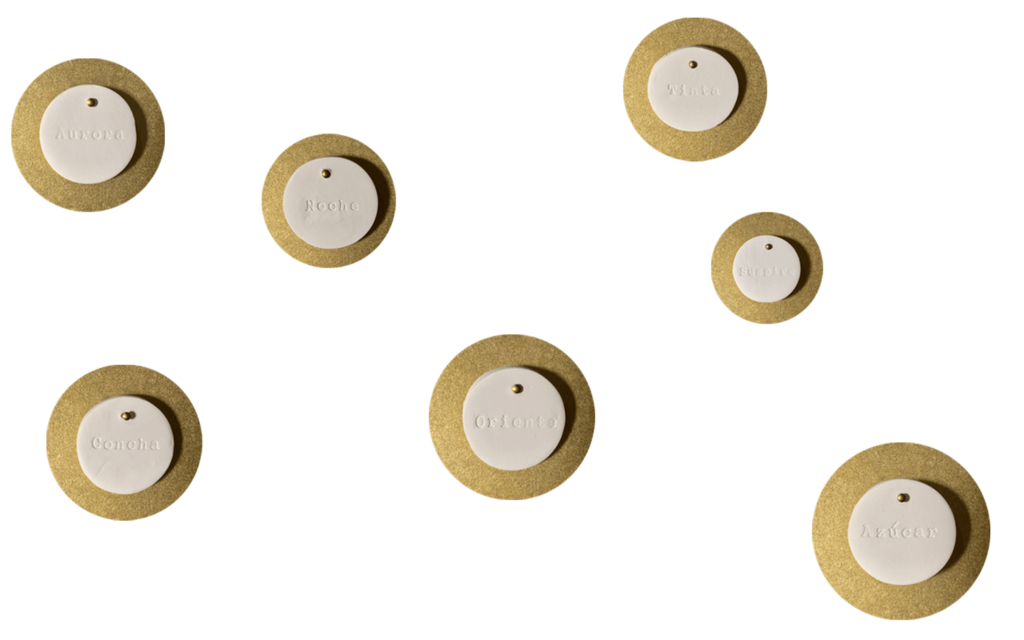
‘Mi Arrullo’ / ‘My Lullaby’ (2020)
When we move to a new territory for a very long time, we learn many new words in the local language and gradually starts forgetting some words in our Mother Tongue.
‘Mi Arrullo’ is a treasure trove of Spanish words, I find strongly poetic and evoking, charged with emotional meaning to me. Set up as an always-changing constellation, these words form an on-growing personal linguistic map. In order to save them from oblivion, I wished to give these words a materiality by physically inscribing them and animating them with my voice as a cradle song

Sunt lacrymae rerum et mentem mortalia tangent – All things have their tears which move the hearts of mortals, is a phrase pronounced by Aeneas, Virgil’s hero in his story ‘The Aeneid’. Contemplating a fresco depicting episodes from the Trojan War, Aeneas is deeply moved by the evocative power of the representation. His eyes misted with tears, he sees the trials of his own life unfold on the clay. The tears of things, evokes a world in which an inanimate universe accompanies humankind in its suffering.
Words, sometimes can’t really fully express what we feel or accurately recreate what recalling may stir in us. There is so much of these emotions that is left unutterable. Still, no word speaks louder than tears, are an embellished language system that augments and transcends the spoken words. Mysterious form of communication, tears are physical mirrors of our personal language of intimacy.
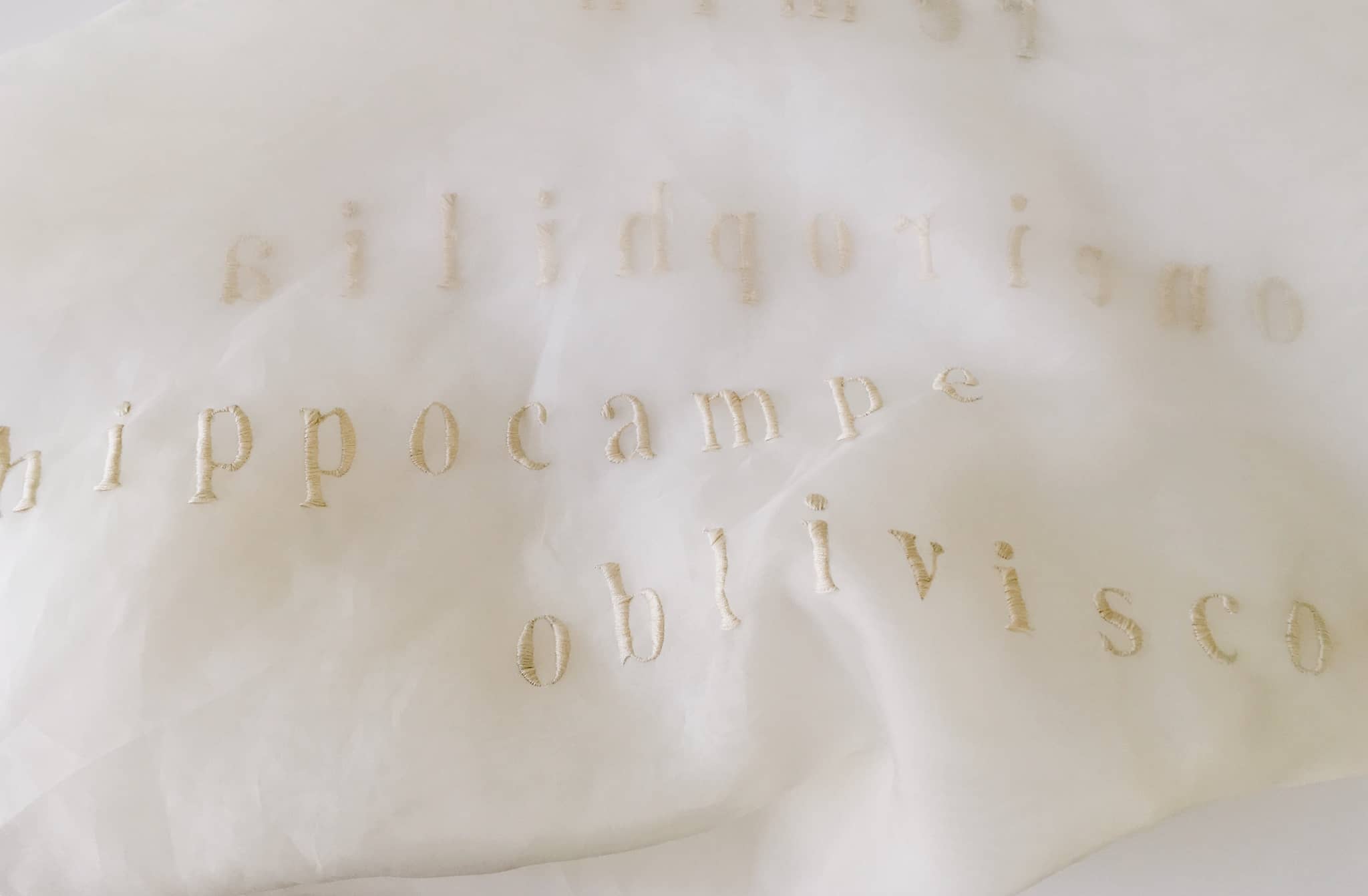
Where do dreams go when forgotten? Sleep as a state of greatly reduced external information processing, plays a critical role in the consolidation of memories. Memories are mental content, building blocks for dreams. Yet, memories of vivid dreams disappear soon after waking up. Dreaming involves some of the most creative and uncanny material and this type of less consciously directed thinking is not easy to remember. Many of our thoughts, not just those we have while dreaming, are lost because we tend to forget nonessentials. In fact, we tend to recall only things that we think about often or that have emotional significance. These thoughts or memories activate our brain region that facilitates memory. Although most dreams vanish, certain ones tend to remain. Beautiful, scary or bizarre dreams may capture our attention. The more impressive our dreams or thoughts are, the more likely we remember them.
oneiroiphilia: love for dreaming from Greek Oneroi (dreams) and Philia (love)
ars memoriae: Art of memory, is a mnemonic strategy in which the items to be remembered are mentally associated with specific physical locations (loci/places).
hippocampe: The hippocampus is the part of the brain involved in the storage of memories, and learning.
reminiscor: latin word for remembering
obliviscor: latin word for forgetting
athazagoraphobia: is a fear of forgetting someone or something, as well as a fear of being forgotten.
A song from before I can remember, 2020
Digging in my childhood sound memories, I remembered a little music box I used to play at night. I had absolutely forgotten this object and its tune was lost somewhere in the obscurity of oblivion. It was serendipity that brought this tune and its intact nostalgic souvenir back to me in.
“Where words fail, music speaks” it has been said. Music is a universal feature of the human experience and as an “emotional language”, it encrypts intimate memories in our emotive and cognitive system. The pitch, rhythm, and tempo—of a melody contribute to the expression of emotions in music. Language has melody too—which linguists call prosody. Exactly these same features are used to convey emotion in speech. Since music and language have these features in common, it is likely that they share the same origin, singing and poetry; the desire to express feelings.
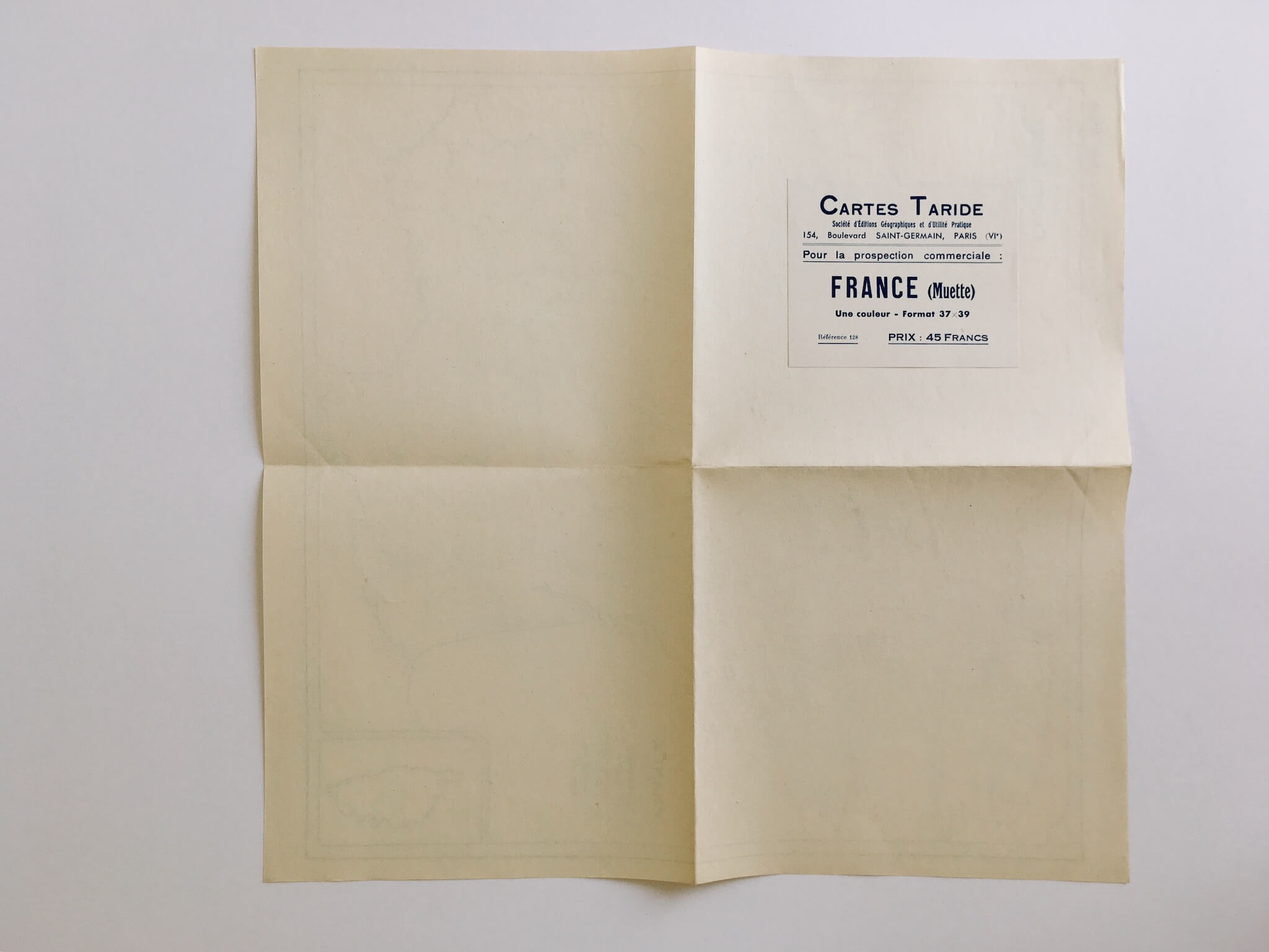
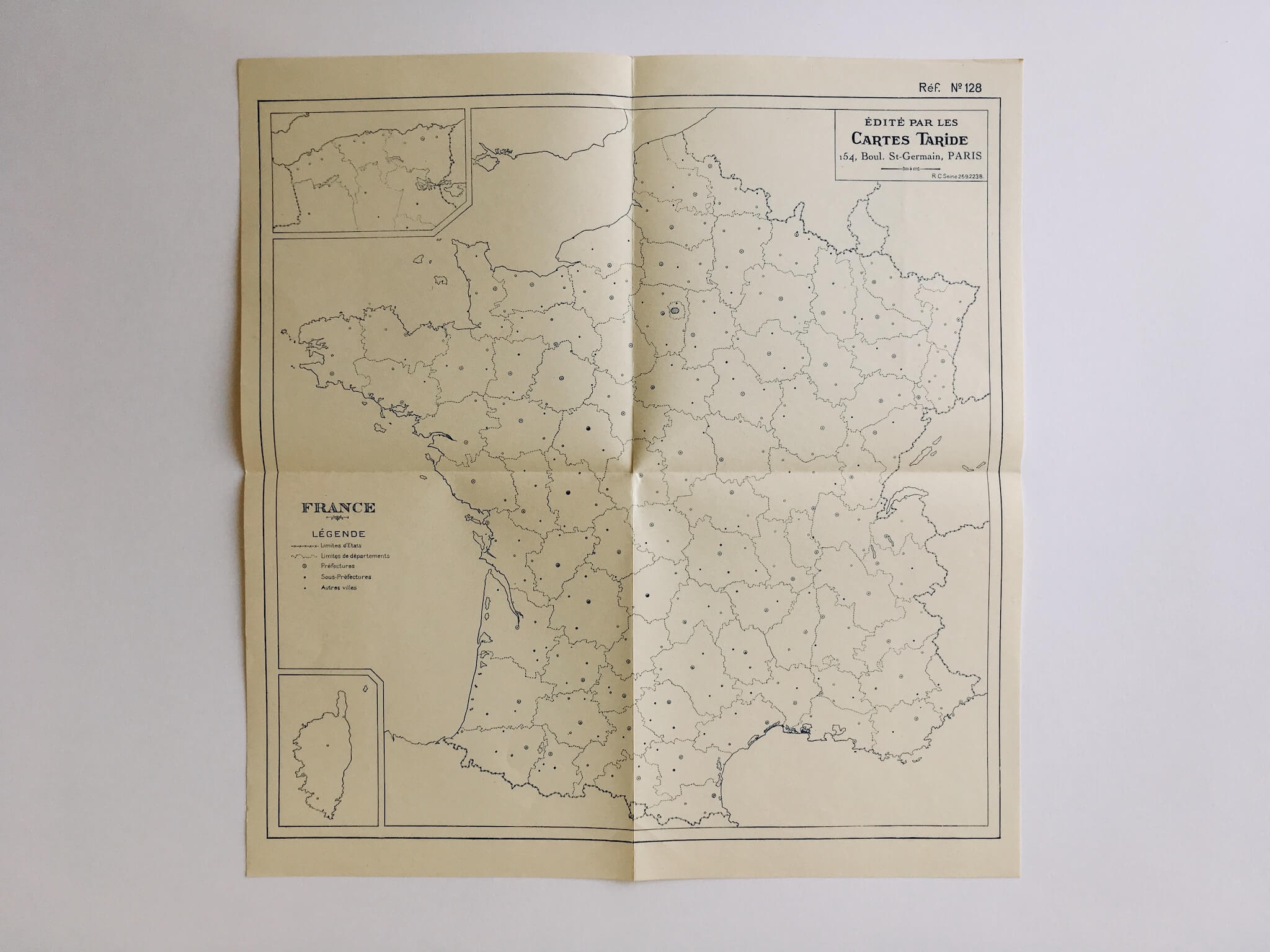
Terra Incognita/ Mare Incognitum, 2020
France (Muette)- Mute France. Found Map.
Terra Incognita or terra ignota (Latin “unknown land”) is a term used in cartography for regions that have not been mapped or documented. The expression is believed to be first seen in Ptolemy’s Geography c. 150. The term was reintroduced in the 15th century from the rediscovery of Ptolemy’s work during the Age of Discovery. The equivalent on French maps would be terres inconnues (plural form), and some English maps may show Parts Unknown. Similarly, uncharted or unknown seas would be labeled Mare Incognitum, Latin for “unknown sea”.